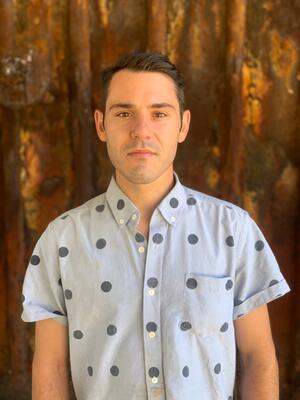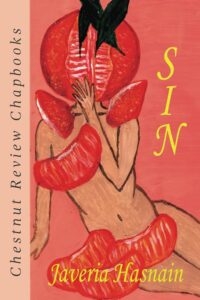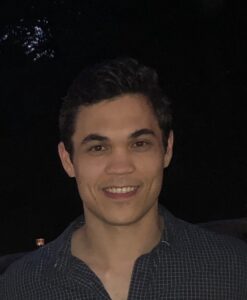Where in the body do I begin: Grass and Hunger in Layli Long Soldier’s Whereas
James Ciano
February 3, 2023
The cover of Layli Long Soldier’s debut poetry collection Whereas is a still from the film Modest Livelihood, by Brian Jungen and Duane Linklater. Both filmmakers are Indigenous artists – Jungen of the First Nations Dane-zaa, and Linklater of the Omaskêko Cree. Much of Modest Livelihood takes place over the course of a day-long hunting trip in Peace Country on the territories of the DaneZaa in northern British Columbia. The film’s title comes from the territory treaty that guarantees First Nations’ rights to hunt and fish on the land, but clarifies that the right is limited to a “moderate livelihood,” not to the “accumulation of wealth.”
I begin with the cover as a foreground to the collection, something that sets the tone – it is the first thing readers encounter when approaching the book. The cover image embodies three imagistic threads I want to trace over the course of Whereas: grass, hunger, and language. By choosing an image in which grass features prominently, from a film about native hunting rights – rights related to hunger and sustenance and the way that legal language compromises that livelihood – Long Soldier sets up three of the book’s central concerns.
I see an intimate connection between occurrences of grass and occurrences of hunger in Long Soldier’s text, as they both relate to the spatial location of the mouth. The poem “38” most profoundly embodies this relationship, but it also plays out in numerous other poems, including “Look,” “Steady Summer” and “Irony.” It is not only hunger and grass that occupy the space of the mouth in Long Soldier’s book, but also language, and in turning my attention to these instances of grass and hunger, I am hoping to illuminate Long Soldier’s complex relationship to the personal and historical uses and limits of language.
Despite living in the southwest almost all of her life, Long Soldier has often spoken about her ancestral homeland the Pine Ridge Reservation, and the feeling, as Long Soldier describes it, of returning there.
When I would go up north to visit my family, always the first thing that represented home was the grass, the smell, the site of it, and when I would come back to the four corners, that was the first thing I would miss, the grass.
(Long Soldier 00:9:45—00:10:07)
The grasses hold many meanings for Long Soldier. They act as a resonant symbol for place and identity, and in the book’s opening they read as poetic invocation. Poetry Foundation defines the term “invocation” as “an address to a deity or muse that often takes the form of a request for help in composing the poem at hand.” With this definition in mind I turn to Long Soldier’s invocation:
Now
Make room in the mouth
For grassesgrassesgrasses (5)
This poem feels deliberate in how it echoes the tradition of poetic invocation, yet subversive in its employment. When summoned in this instance, it isn’t language that the muse places in the mouth, but rather “grassesgrassesgrasses.” For Long Soldier, it is the “grassesgrassesgrasses” that take the place of language in the mouth, substitutive and transcendent. It seems that grasses posit a different kind of language, one outside of a Greco-Roman, Eurocentric poetic tradition.
This poem, in the imperative, also reads as a command to the reader and as a shift from what the reader might traditionally expect. The “Now” of the first line temporally implies a before; the imperative commands the reader as they enter Long Soldier’s book to “make room” for a departure from the past and a movement into a different kind conception of language, one with a logic centered on “grassesgrassesgrasses.” In these multiple repetitions, Long Soldier at once emphasizes grasses for their logocentric meaning and de-signifies them from their logocentric meaning. Long Soldier sets up a relationship to the English language that decenters received Eurocentric or colonial poetic tradition and, through an emphasis on grasses, seeks to think through new linguistic possibilities outside of the linguistic systems of settler colonialism.
With these opening lines, Long Soldier also emphasizes overtures of hunger and sustenance that will return later in the book. Spatially, language can usher forth from the mouth, but in the poem it appears as though grasses are being put back into it. The “grassesgrassesgrasses,” while positing a new way to think through language, also suggest nourishment, in the sense that they are received by the mouth. This image of grass received by the mouth comes to take on new resonance later in the book in the poem “38.”
In the poem “Look,” grass and language literally and figuratively come apart through the poem’s structure and Long Soldier’s formal and conceptual experimentation. The poem’s title, “Look,” is in the imperative, another example of Long Soldier commanding the reader to see differently, to see anew. The poem’s form is itself grass-like, narrow as a single blade, often with only one or two words per line. These one- or two-word lines put a tremendous amount of pressure on the language, so much so that words themselves begin to split apart, much like the type of splitting apart that is happening in the poem’s content. In the poem, the speaker looks out at “a green hill” until she pulls out grass and then splits the grass apart:
stalk ‘n root
up
from
black matte
soil bed
bead s
from grass-
head s
one by
one a
part I
s p l i t
grass wires (11-12)
Here, on the page, Long Soldier formally enacts the poem’s content. Not only is the speaker splitting apart the “grass wires,” but Long Soldier breaks apart the words themselves on the page. This creates a visual ligature between grass and language, via a physical deconstruction or taking apart. The spaces between words create a deliberate slowness to how they are read – by isolating them, the words slowly lose their semantic meanings and return to the sonic textures of the mouth. It is this linguistic word play and pressure Long Soldier places on language that destabilizes our understanding of it, and, by destabilizing language, Long Soldier attempts to build something new.
Later in this poem Long Soldier writes,
green
drop
lets I
sentence
to life
less light
quick dead
grass
skulls (12)
Again, Long Soldier uses short lines to pull words apart by enjambing words across lines: “drop/lets,” “life/less.” Here, though, I want to point to the word “sentence.” The speaker is pulling apart grass, turning the living grass to “grass/skulls.” But, through her linguistic wordplay, Long Soldier wraps multiple levels of meaning around the sequence, “lets I/sentence/to life.” Hyper-aware of the legal erasure she writes against, the choice of the word “sentence” here in “I/sentence/to life” ripples with all the subtext of judiciary legalese. Yet, given Long Soldier’s experiments with language, it feels like “sentence” also carries with it “sentence” in the syntactical sense, as in writing bringing something to life, or to light. “I/sentence/to life/less light” speaks to the ways that language, specifically the unit of the sentence, can erase, kill, animate, or expose.
Long Soldier anthropomorphizes the grass in “Look” – specifically the two phrases “from grass-/ head s” and “quick dead/ grass/skulls.” This focus on the “heads” and “skulls” of the grass feels resonant in thinking through the later poem “38,” and the hanging of thirty-eight Dakota tribesman. Long Soldier implies an echo of this violent hanging through the focus on the “heads” and “skulls” of the grass, as if the land and the grass were imbued with, soaked with, the violence of the past atrocities committed on it.
The grasses reappear in the poem “Steady Summer.” While in “Look” Long Soldier may have sentenced the grass “to life/less light,” in “Steady Summer” Long Soldier re-animates the grass back to life. In “June light” the poem’s speaker describes the “solstice grasses,” and how “when they fast/they cannot food”(31). The “they” here seems a bit ambiguous, possibly referring to the grasses, or perhaps to the “he” and the other people the speaker is with. Either way, again, Long Soldier links inextricably grass and hunger, and in this line recalls the historical genocide linked to starvation and food, which she writes about further in “38.”
In “Steady Summer” the grasses are referred to for their reparative properties, “this one’s a natural/ anesthetic” and “slide/grass needle tips/around the edges/ of wounds this summer” (31). While these practices are more linked to processes of physical healing, I can’t help but read the grasses as a larger reparative force, a sort of spiritual and linguistic antidote to the continual permeations and legacies of settler colonialism on the lives of native peoples. “Through half-propped/windows I swallow/grass scent the solstice.” Here the speaker literally “swallows” the scent of the grass, as if it were a tablespoon of medicine. Even though it is the “scent” of grass, the space of confluence remains the mouth, the space of both hunger and language. For the speaker, “in those/heady grasses the mouth/loosens confesses:/ I don’t trust nobody/but the land I said” (32).Again, here Long Soldier intimately connects the grass to the mouth and to language. The land, and the grasses of the land, “loosen” the mouth of the speaker – here grass gives way to language, to agency.
I think it is important to note here the stylistic choice to italicize “I don’t trust nobody/but the land I said.” The only other parts of this poem that are italicized are when the grass seems to speak its own language, “a grass chorus moves shhhhh.” Long Soldier repeats the italicized “shhhhh” throughout the poem to signify any time the grass sounds or speaks, and I think these two instances of italicization create a visual and semantic linkage between the italicized language of the speaker and the italicized language of the grasses. This italicized language seems to work outside of the boundaries of the unitalicized language of the poem. That is, until Long Soldier blends the two in the poem’s ending. “This grassshhhhh” combines both linguistic registers – the italicized, reparative register that belongs to grass and communicates outside of colonial linguistic histories, and the register of the unitalicized, the imposed, perhaps the “official” (33). Although unitalicized, the poem’s last line, “who have I become,” addresses a blurring between the speaker’s language and agency, and the language and agency of the grasses.
I want to turn now to “Irony,” a poem that I think braids together the threads of language, grass, and hunger. When this poem was originally published in Poets.org’s Poem-a-Day, Long Soldier wrote, “‘Irony’ is one of six poems I’ve written on grasses in the last few years. My dad’s family is from the Pine Ridge Reservation in South Dakota and my mom’s family is from northern Idaho, yet I grew up in the Southwest. When I travel north, it’s the grasses that speak warmly in welcome and they’re what I miss most when I leave.” This context helps situate the reader in approaching “Irony.” Long Soldier currently lives in the Southwest, and the poem begins there, in the “red sand” and “coral brick/hooghaan” (a traditional Navajo dwelling), amongst “desert/white flowers.” The poem shifts about halfway down the page, from the landscape of the Four Corners to the landscape of “origin”:
Me I grass
Nothing
Here I meta-
Grass I sleep-
Walk grasses
Open eyes to
Blue corn sky (45)
Again, Long Soldier’s linguistic inventiveness feels deliberate when she writes “Me I grass/nothing.” By using “grass” as a verb in this instance, Long Soldier not only declares its absence from the desert landscape, but also signals to the verb “grasp” (one letter away from “grass”) without having to use it. By employing the prefix “meta” in conjunction with “grass,” Long Soldier denotes a change of position or condition, a metamorphosizing of landscape from the southwest to the grasses of her homeland. Long Soldier continues, “I sleep-/walk grasses/open eyes to/blue corn sky/to cook up/stews chunks.” Opening her eyes completes the transition of landscapes, and returns her to the place of a “blue corn sky.” Upon this return, the poem transitions into nourishment and sustenance, in a stunning moment of ravenous hunger:
I am this
salivating
mouth without
hands with-
out arms
bent down
shameless
face to plate to
some origin(al)
hunger aware
that I’m alone
and I alone am
the one –> pushing
the head
to eat. (45-46)
The move in this scene to eating and to sustenance represents a move to the grass, and to the homeland, as a move “to/some origin(al)/hunger.” The return to home nourishes; it feeds life and affirms life. A complex depiction of agency also plays out in the above passage, and speaks to the “Irony” of the poem’s title. The speaker retains total control – she “alone” is the one “pushing/the head/to eat.” She desires to feed on, to be nourished by, the landscape of her homeland, and she controls that desire. The irony here comes from the events of the final poem of the book’s section, “38.”
“38″ marks a shift in Long Soldier’s poetic approach. Where the poems that have come before have all experimented with language, syntax, and grammar – and have sought to undo and rethink Eurocentric linguistic structure – “38” makes its mission clear: “Here, the sentence will be respected”; “I will compose each sentence with care, by minding what the rules for writing dictate” (49). The deliberateness of language feels respectful to the graveness of the poem’s content, the Sioux uprising and the hanging of the Dakota 38. But the tone also is defiant, a middle finger to the legacy of white settler colonialism – and perhaps on Long Soldier’s part, by working in the language and linguistic system of the colonizer, she takes back a language that has sought at every turn to erase her life and the lives of native peoples.
As the poem progresses, Long Soldier reveals the occurrences that led to the hanging of the Dakota 38: “Dakota leaders ceded land to the US/government in exchange for money or goods, but most importantly, the safety of their people” (50). Of course, the treaty that ensured this was broken. As were the future treaties, which revised old treaties. And the treaties after that. Again, Long Soldier pays close attention to the way that the language of the treaty, legal language, slowly began to erase the Dakota people by erasing their land. By 1858, the Dakota land was reduced to “a stark ten-mile tract.” In exchange for land, the treaties promised money, which never came. “Without money, store credit, or rights to hunt beyond their ten-mile tract of land, Dakota people began to starve” (51). This historical context throws so much of the book’s previous focus on hunger, grass, and language into stark relief. “As a result – and without other options but to continue to starve – Dakota people retaliated.” It is one profound act of retaliation that Long Soldier highlights in the end of her poem. It deals with Andrew Myrick, a trader who:
…is famous for his refusal to provide credit to Dakota People by saying, ‘If they are hungry, let them eat grass.’”
There are variations of Myrick’s words, but they are all something to that effect.
When settlers and traders were killed during the Sioux uprising, one of the first to be executed by the Dakota was Andrew Myrick.
When Myrick’s body was found,
his mouth was stuffed with grass. (53)
This moment with Myrick feels central to unlocking the grass’s importance as it relates to hunger and language in the previous poems. When I reread the opening poetic invocation, “Now/make room in the mouth/for grassesgrassesgrasses,” I feel that my understanding of this moment has changed. If, as Long Soldier puts it, this “act by the Dakota warriors is a poem,” if grasses are a language that can be put in a mouth, who are we, as readers of this book, if we have been told in the book’s opening to “make room for grassesgrassesgrasses”?
The irony of the poem “Irony” exists because of this historical moment with Myrick, which, like a stone thrown into a still pond, has rippled all the way to Long Soldier’s present relationship with grass and homeland. The very grass, the very land from which Myrick said, “let them eat,” is the grass and land that sustains the speaker of “Irony.” And it is not the threat of starvation caused by settler colonialism and its language of legality that forces Long Soldier’s head to eat; rather, she writes, “I alone am/the one à pushing/the head/to eat.” The agency reclaimed from the Myricks of history belongs entirely to the speaker.
This poem, which addresses the hanging of the Dakota 38 under the orders of President Abraham Lincoln, comes, in the book’s order, right before the introduction of the US’s Congressional Resolution Apology, signed by then President Barack Obama. This feels intentional to me – not only does it close the gap in time via spatial juxtaposition, but it also points to two of the most well-intentioned, forward-thinking presidents in the country’s history. What has changed? Has anything changed? I think of Long Soldier’s line, “The previous sentence is circular, akin to so many aspects of history.” And the circle can be any number of things: a mouth, a noose, the circle of history. At the end of 38, Long Soldier writes:
Sometimes, when in a circle, if I wish to exit, I must leap.
And let the body swing
From the platform.
Out.
To the grasses. (53)
Although the “platform” and the verb “swing” imply that this is a staging of the hanging of the Dakota 38, I am struck by the ways that this ending transcends the hanging. It offers an “exit” from the “circle,” which is at once a noose, but also the circle of history. What seems to wait at the other end of a leap out of that circle? The “grasses.” In the book’s final lines, its “Disclaimer,” Long Soldier writes the exact words of its opening: “grassesgrassesgrasses.” In creating this new circle of grasses Long Soldier seeks a space in which to rewrite a life spent “in unholding” (79). From the grasses, language becomes not a point of erasure, but a point of nourishment, a point from which to repair.
Works Cited
“Brian Jungen & Duane Linklater: Modest Livelihood.” UChicagoArts.https://arts.uchicago.edu/logan-
center/logan-center-exhibitions/archive/brian-jungen-duane-linklater-modest-livelihood
“Glossary of Poetic Terms: Invocation.” Poetry Foundation.
Long Soldier, Layli. “Irony.” Poem-a-Day. Poets.org, December 7, 2016,
Long Soldier, Layli. “Layli Long Soldier || WHEREAS || Radcliffe Institute.” Youtube, uploaded by Harvard University, 4 April 2018, https://www.youtube.com/watch?v=nCpvSiaz_Ps&t=645s
Long Soldier, Layli. Whereas. Graywolf Press, 2017.






